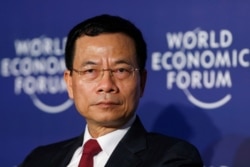Facebook and Google are becoming "zones without human rights" in Vietnam, Amnesty International warned Tuesday, accusing the tech giants of helping to censor peaceful opposition and political freedom in the country.
Amnesty warned that although they were "once the great hope for the rise of freedom of expression in the country, social media platforms are rapidly becoming areas without human rights."
Information Minister Nguyen Manh Hung said last month that tech companies were complying with demands to remove "bad news, propaganda against the party and the state" at a faster rate than ever before, according to state media.
The same article states that this year Facebook complied with 95% of government requests and YouTube, 90%.
A Facebook spokesperson told AFP that the platform is working hard to defend freedom of expression around the world.
"Over the past few months, we have experienced additional pressure from the Vietnamese government to limit more content, however we will do our best to ensure that our services remain accessible, so that people can continue to express themselves," he clarified.
Google and the Vietnamese authorities did not respond to AFP's requests.
Communist Vietnam has long imprisoned its dissidents but has been criticized in recent years for targeting users of Facebook, a social network popular with activists in the country where independent media is banned.
The social network admitted earlier this year that it was blocking content deemed illegal by the authorities, while its latest transparency report reveals an increase in six months of nearly 1,000% of content censored by order of the government.
Amnesty International said in a report published Tuesday that it had collected the testimonies of 11 activists whose publications were banned by Facebook in Vietnam this year.
The human rights organization also said that three other people have suffered similar censorship of their content on YouTube, owned by Google.
One of them, Nguyen Van Trang, who fled an arrest warrant in Vietnam for his involvement in a pro-democracy group, said that Facebook had since May restricted the visibility of all its publications about Communist Party boss Nguyen Phu Trong and senior member Tran Quoc Vuong.
Trang also said that some of his posts on controversial issues such as the land dispute have been made inaccessible by YouTube in Vietnam.
Obstruction of 'the progress of a nation'
"I am angry," he told AFP. "For activists, these platforms play an important role in influencing people on progressive values like democracy, human rights, civil society."
"The compromise of Facebook and Google is not only to block information, but also to hamper the progress of a nation, where the inhabitants do not have many opportunities to participate in political activities," he added.
Vietnam is now the country that generates the most revenue for Facebook and Google in Southeast Asia, according to industry experts.
More than 53 million people use Facebook in Vietnam, more than half of the population. The platform is also an important marketing tool for the local economy.





